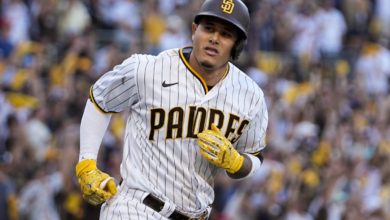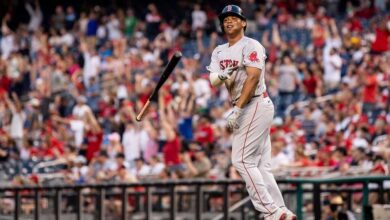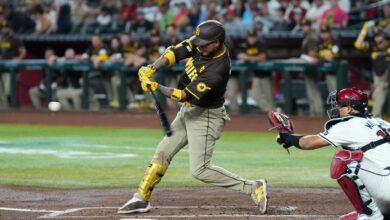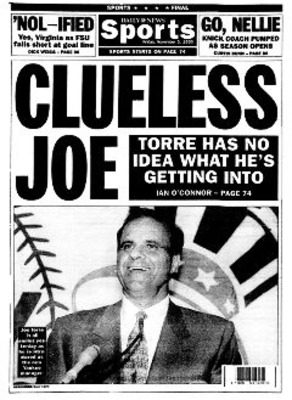
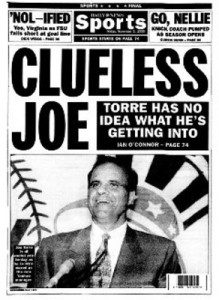
Almost nothing can get a fan base more pumped up than firing and/or hiring a “big name” manager or coach. The media will jump on board, often times running with catchy quotes and lines about how this time will be different and how the new coach will implement many changes and introduce a new culture.
If the sport you’re following is professional football, then you are in luck. Football is such a complex game with so many moving parts, without adequate coaching, preparation and game planning, it’s nearly impossible to achieve success. Therefore, more times than not, when an elite coach is hired by a franchise, winning will soon follow. Some recent examples: Bill Parcells to the Jets, Pats and the Cowboys; Jon Gruden to Tampa, Mike Holmgren in Seattle and Norv Turner to San Diego … kidding. Norv’s a great example about how a coach can prevent his team from reaching their potential. Just watch the Chargers’ 2010 and 2011 team video.
However, if baseball is your sport and you think that new manager will change the fortunes of your team, the odds are not in your favor.
For all the talk about how managers change the culture of a franchise or how they handle the media or how great their clubhouse is and how they interact with the players … I have a little secret: It doesn’t matter. Baseball players are creatures of habit who are incredibly routine oriented. While some players may love, hate, or even be indifferent to their manager, it does not affect their performance on a day-in-day-out basis. The whole idea of a great baseball manager is a perception which is not rooted in reality. Let’s examine the careers of some recent managers.
After the 1995 season, the Yankees were coming off their first playoff appearance in over a decade. Buck Showalter was a smart, hard-working, young manager, and he appeared to have a bright future in the game. Nevertheless, George Steinbrenner, frustrated after losing a brutal five game series to the Mariners, didn’t offer him a contract, and he was gone. As we know, Joe Torre replaced him, and the Yankees won four World Series under his watch. The day after he was hired, the back page of the New York Post read “Clueless Joe,” and most Yankee fans were outraged. Did the Yankees win all of those championships because of Torre? Of course not. Would they have won at least four with Showalter? They probably would have. Torre was fortunate to take over the team right as its core group of players were hitting their primes. Furthermore, Torre was also the beneficiary of new revenue streams which came pouring into the Bronx (see the YES Network), thus enabling the Yankees to spend millions more on players than most of the competition.
Kirk Gibson also received a lot of publicity during 2011 (NL Manager of the Year) for the Diamondbacks great play, which resulted in a division title. There was the usual chatter of changing the clubhouse culture, making the players more accountable and, of course, re-invigorating the running game with the constant green light on the bases. Personally, I think Arizona’s resurgence was owed to Justin Upton, arguably the league MVP (he finished fourth), a career year from Ryan Roberts, Ian Kennedy putting everything together (and getting far away from the AL East) and, lastly, a tremendous year from their bullpen, the league’s worst in 2010. Arizona GM Kevin Towers deserves a ton of credit for dumping strikeout king Mark Reynolds and getting back David Hernandez, who filled in admirably when closer J.J. Putz was hurt. Hernandez was the lynchpin for the Diamondbacks pen all year.
All we heard during spring training in 2011 was what a breath of fresh air Mike Quade provided the Cubs. He was a “player’s manager,” he let certain players know when their off days were, and he was a lot more upbeat than predecessor Lou Piniella. Well, let’s just say that it wasn’t the manager. The Cubs were 23 games under .500 when Piniella quit in 2010, and they finished 20 games under in 2011 with basically the same team. Maybe it wasn’t Lou’s fault. The real culprit behind the mess the Cubs have become is former GM Jim Hendry. Hendry assembled the mess Theo Epstein and Jed Hoyer are in the process of cleaning. Let’s take a closer look at the talent and salary for their key personnel.
1. Carlos Zambrano, who had his umpteenth meltdown in 2011, had to be traded (for perennial underachiever Chris Volstad) to Miami this offseason, with the Cubs assuming close to 95 percent of his $18 million salary.
2. Kosuke Fukodome looked to be a great signing after his first game as a Cub when he hit a game-tying, three-run HR in the ninth inning. However, that proved to be his highlight as a Cub. He had no power or speed, and Hendry was able to dump him on Cleveland at the deadline.
3. Alfonso Soriano is, quite possibly, the most overpaid player in sports. Soriano is making $18 million this year and every year through 2014. This, for a player who doesn’t get on base (.289 On Base Percentage) doesn’t run (two steals) and had a four-to-one strikeout/walk ratio in 2011. Furthermore, he is a massive liability in the outfield. Yes, he was hot in April and he hit 26 home runs. Nevertheless, he is exactly the kind of player I do not want big money invested in.
Another great example is Art Howe. Howe came to the Mets fresh off three straight postseason appearances with the Oakland Athletics. Howe’s laid-back, nonchalant attitude did not play in New York. That, along with a fourth and fifth place finish doomed him, and he was run out of town after two years. Did Howe forget how to manage on the long flight from Oakland to NY? Probably not. More likely, however, having to replace Tim Hudson, Mark Mulder and Barry Zito with Steve Trachsal, Jae Seo and an over-the-hill Al Leiter led to his demise.
It is also worth noting that, often times, when there is a managerial change, it is because a team has vastly underachieved. Baseball is an equalizing game; for example, a career .300 hitter who hits .250 for half the year will usually end up hitting .350 for the other half. Therefore, a new manager will often benefit from his team playing better under his watch, because the players are returning to their normal levels if a switch is made during the middle of the season. This can be confusing for the casual fan, since he/she will often attribute the turnaround to the new manager.


